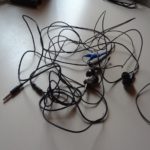The TV turns on and turns off immediately: reason
Not a single household appliance, no matter how expensive it is or has the appearance of a reliable rock, is immune from breakdown. Especially something as high-tech as a modern TV. After all, today it is not a simple device for watching programs; it can be a TV tuner, a computer or a multimedia center with Internet access. If the problem is visible visually - a fallen wiring, a blown fuse or element, then it is easy to fix it. But usually breakdowns, or more often several at once, are hidden in the depths of the device, so the effectiveness of repairs and the operability of the device are all in the hands of the master.
The content of the article
Why is this happening?
So, the TV turns on spontaneously, works for a few seconds, minutes and turns off. As practice shows, there are many reasons that led to such an “independent life” of the device. But before you start looking for a repairman and counting the costs of repairs, it’s worth understanding that the TV itself is not to be blamed in all cases.
Often you yourself are to blame for the problem - poor contact in the power cord, frayed wire, unreliable, dangling socket. Or maybe you just haven’t cleaned your device for a long time - and the dust is just preventing you from spending a decent evening in front of a blue screen? Perhaps the reason for this behavior is power surges.Then we measure the voltage in the network with a tester, compare it with the original one, and go argue with the housing office.
Now about each reason in more detail, we will give recommendations for elimination so that this does not happen in the future.
Human factor
70% of the normal performance of the device depends on human attention and attitude towards it. You can’t get around to fixing a socket on the wall, fixing a frayed wire, or tightening a loose plug - so why do you complain that modern technology is unreliable? Poor contact leads to heating of the electrical wiring, the plug becomes hot. Even short-term exposure to high temperatures can cause a short circuit.
ATTENTION. In this case, turning off the TV is a minimal problem. In the event of a short circuit, the wiring may burn out, leading to a fire.
And the solution is simple - monitor the integrity of the power cord, the reliability of the connection of sockets and plugs. If there are children in the house, then this must be done before each turn on.
Software problems
Another problem that occurs due to the user’s fault can be resolved by pressing a few buttons on the remote control. There is no need for a master here.
Owners of modern Samsung and LG TVs were the first to notice a malfunction of this nature. The latest TV models, in addition to their main function - showing programs, connect to the Internet themselves, download software updates, and do many more actions that are useful for themselves, but questionable for the user. If the user has not disabled this function, then after browsing the World Wide Web, the TV automatically turns off after a specified time.
In addition, it is possible:
- The device is not configured correctly.
- Some TV models automatically turn off if there is no reception signal or there is no input from the remote control.
- A program has been set that will automatically turn off the TV after a specified time (for example, a minute).
The way to deal with this is to go to the submenu, find the functions that are configured in the device. Remove the ability to update software yourself and automatically turn off. Also check where the device has been and what it has downloaded. Select and remove suspicious programs.
Blame the dust
Another problem that occurs due to the user’s fault, which occurs quite often, is the accumulated dust inside the device. Dust itself is not a good conductor, but if it accumulates in large quantities, it can cause short circuits between the tracks and the body. This is fraught with burnout of some elements and the power supply board. The solution lies on the surface - it is enough to carefully clean the inside of the device with a vacuum cleaner once every six months. You also need to take care of the remote control. Carry out preventative cleaning of contacts and tracks. Wipe the board with alcohol and let dry before reassembling. If after such cleaning the TV continues to behave as it wants, then perhaps the problem is with the inverter.
The inverter is to blame
Perhaps the reason for the chaotic switching on/off of the device is microcracks in the tracks along the power supply circuit. This happens due to the following:
- Power surges in the network;
- High room humidity;
- During operation of the device, periodic strong heating occurs.
- Aging of materials and installation elements.
This problem is serious, although it occurs frequently. You can't fix it yourself. We need to turn to professionals. But you can identify it yourself.Disconnect the TV from the power source. Use a table lamp or flashlight to provide sufficient illumination. Remove the cover, then carefully use a magnifying glass to examine the traces of the printed circuit board, the elements themselves, their connections, and the quality of soldering.
IMPORTANT. Even small cracks and breaks cause instability of the device.
If you succeed in finding microcracks, then in a workshop or service center you can indicate a specific location. This will please you and speed up the resolution of the problem.
Power surges
Another common defect that causes the device to turn on/off randomly. All household appliances suffer from uneven voltage supplied to the apartment, especially sensitive ones such as the TV. Jumps are possible due to heavy network load, instability, malfunction of transformers at the substation, weather changes, increased environmental humidity, etc. Modern devices provide a circuit that can smooth out small irregularities in the network voltage; for more serious ones, additional stabilizers will be required.
This factor can cause the equipment to become very hot, causing the indicator to burn out and the winding to be damaged.
Power supply burnout
The power supply is the most loaded part of the entire TV. There is a high probability of its burnout due to a power surge.
Symptoms indicating that there are problems in the power supply:
- The device shows no signs of life, there is no response to pressing buttons.
- Spontaneous switching on and then switching off of the device.
- The power indicator lights up, goes out instantly, and flashes.
In most of these cases the fuse blows. This can be seen with the naked eye: it swells, its leg breaks.Replacement is simple - take the burnt out element, take it to the store, buy a new one. Then use a soldering iron to solder on the back side of the board. Other unsoldered elements should not be touched - you may damage the integrity of the tracks or burn out elements located nearby. This may result in new problems, and therefore additional costs. If only the power supply burns out during a power surge, then it is easy to repair - it is completely replaced. It’s worse if the drop goes further, other elements are damaged. It costs more and is more difficult to repair. Repairs make no financial sense if the kinescope or LCD matrix is damaged. This is commensurate with buying a new one.
ADVICE. There was a power surge in the house. You must immediately record its exact time. Then call an authorized technician who will determine the cost of the damage. A paper is being written to MosEnergoSbyt, where you must be compensated for all losses.
And now the main thing
The first causes, not related to the device itself, can be easily eliminated. But if you have never held a soldering iron in your hands, all knowledge of electrical engineering is limited to a school course, then DO NOT TOUCH ANYTHING, immediately contact the service center. They will determine the cause and eliminate it. It will be much more difficult and expensive to do this after the intervention of an amateur.






What tannic advice. How can I access the menu if the TV turns on and the screen turns off within 3-5 seconds?